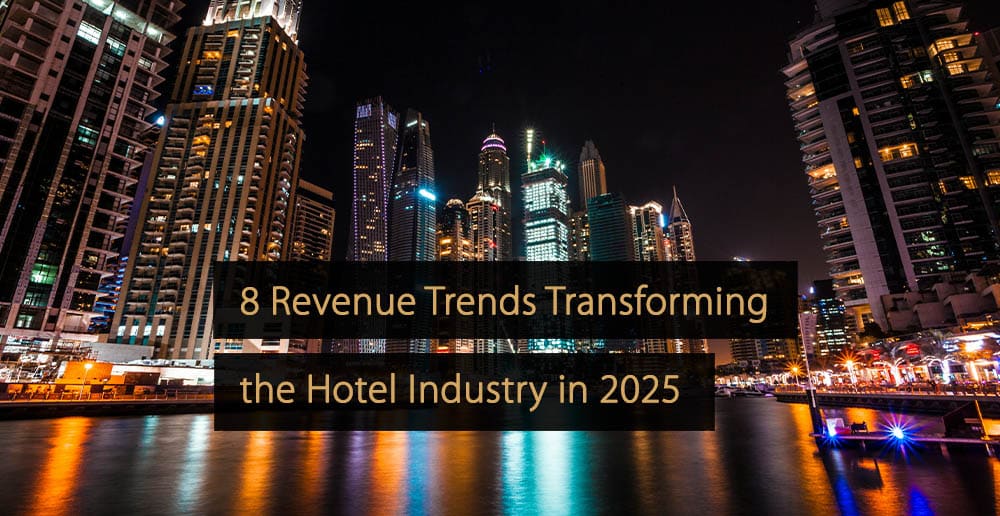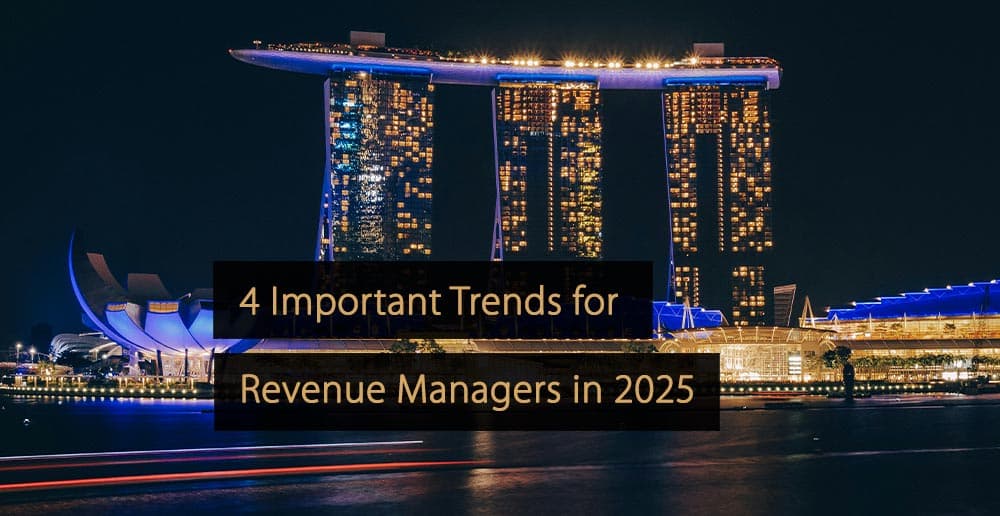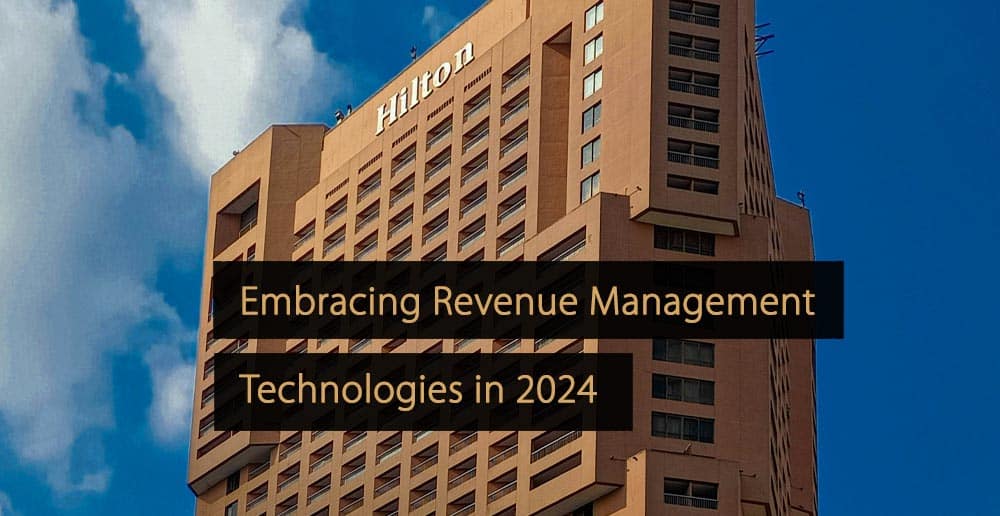The year 2023 has brought about significant changes in the hotel industry, with revenue management practices and trends evolving rapidly. As these trends continue to take shape, their impact will undoubtedly shape strategies and operations well into 2024. This article provides valuable insights into the key factors influencing the financial landscape of the hotel industry, offering practical examples from hotels that are leading the way.
5 Hotel Revenue Trends for 2024 Hoteliers Should Be Aware of
To bridge the gap between theory and practice, we have incorporated real hotel examples for each trend, showcasing how these concepts are being transformed into actionable strategies that other hotels can learn from. Please note that the names of the hotels provided are fictional and created for illustrative purposes.
1. Embracing Automation and Cutting-Edge Technology
The hotel industry has witnessed a significant technological revolution in 2023. There has been a noticeable surge in hotels integrating automated systems to streamline operations, reduce human error, and boost efficiency.
According to a hospitality report by Deloitte, more than half of hotels are operating with 25-74% of their pre-pandemic workforce, relying on emerging technologies like AI and cloud solutions to address labor shortages and enhance performance. While most hotels don’t foresee a return to pre-pandemic staffing levels anytime soon, they are adopting these strategies to embrace new technology and automate repetitive tasks.
Advanced Revenue Management Systems (RMS) are pivotal, offering real-time insights, demand forecasting, and room rate optimization. Additionally, business intelligence tools empower hoteliers to understand market trends, guest preferences, and competitor strategies, ensuring well-informed decision-making.
Example 1: Nebula Urban Hotel, New York City
The Nebula Urban Hotel has fully embraced the digital age in the bustling heart of Manhattan. In 2023, they introduced their proprietary AI-driven concierge system, “Aria.” Aria enables guests to handle everything from online check-ins to room service orders without human intervention. The system continuously learns from guest interactions, offering personalized recommendations from the best dining spots in the city to curated playlists for in-room sound systems. With a reduced front desk staff, the Nebula Hotel allocates more resources toward innovatively enhancing guest experiences.
Example 2: Lavender Heights Resort, Tuscany
Nestled amidst the picturesque vineyards of Tuscany, the Lavender Heights Resort caters to a diverse clientele, ranging from honeymooners to corporate retreats. Recognizing the need for a flexible and responsive pricing strategy due to the region’s varied guest profile and seasonal nature, they implemented an RMS powered by cutting-edge machine learning algorithms in early 2023. This system monitors internal data (such as room occupancy rates and past seasonal booking patterns) and external factors (including local festivals, competitor pricing, and search pressure data). Based on this data, room rates are dynamically adjusted. Since implementing this system, Lavender Heights has experienced a 15% increase in revenue and a notable rise in off-peak season bookings, validating its tech-forward approach.
2. The Digital Transformation: Data Reshaping Hotel Revenue Management
The field of hotel revenue management has entered a new era characterized by data-driven sophistication. In 2023, more hotels are harnessing the power of data analytics to turn vast amounts of information into actionable strategies.
Understanding Booking Patterns
Cerulean Towers in Tokyo, renowned for its iconic skyline views, employs advanced analytics to identify peak booking times. They have discerned a trend where international business travelers tend to book their stays three months in advance, while domestic tourists book just a month prior. With this knowledge, the hotel tailors its marketing campaigns accordingly, targeting the right audience at the right time.
Adapting to Seasonal Shifts
Bella Vista Beach Resort on the Amalfi Coast uses data to comprehend seasonal booking trends. While summer remains their peak season, they have noticed an increase in autumn bookings, particularly from couples seeking a quieter, romantic getaway. The resort now offers specialized “Autumn Romance” packages during this period, capitalizing on this emerging trend.
Creating Guest-Centric Experiences
The Urban Loft Hotel in Chicago leverages guest preference data to enhance the guest experience. By analyzing data from returning guests, they have identified a preference for rooms with city views over park views. Consequently, they have adjusted their room pricing model, offering premium rates for city-view rooms.
Dynamic Pricing Strategies
The Royale Chateau in Paris has integrated an advanced Revenue Management System that tracks real-time demand fluctuations. In the case of a significant event in the city, such as Paris Fashion Week, their system automatically adjusts room rates to reflect the increased demand, ensuring they maximize revenue during high-demand periods.
In an industry where guest preferences and market dynamics constantly evolve, data is a guiding compass, allowing hotels to make informed and profitable decisions. The synergy of data analytics and Revenue Management Systems equips hotels to anticipate trends, adjust strategies, and thrive in a competitive landscape.
3. Flexibility in Pricing: The Art of Adaptive Strategies
The market dynamics in 2023 have pushed hotels toward more flexible pricing strategies. Static pricing gives way to real-time, dynamic adjustments considering many factors.
Real-time Adjustments for Demand
The Riviera Grand in Miami employs a cutting-edge pricing system that automatically adjusts room rates based on real-time demand. If a major music festival is announced, room prices increase to capitalize on the heightened demand, while quieter periods may see more competitive pricing to attract visitors.
Tailoring to Local Events
Highland Manor in Edinburgh, located near the annual Fringe Festival venues, closely monitors event schedules. They offer special packages during the festival, including tickets and guided tours, priced attractively to draw attendees.
Economic Trend Responses
Metropolitan Heights in Tokyo has introduced “Recession Specials” in response to broader economic downturns, offering discounted stays with added-value services like complimentary meals or spa treatments. Conversely, they introduce premium packages targeting business travelers and affluent tourists during economic booms.
Attracting a Diverse Clientele
Casa Del Sol in Barcelona, known for its beachfront views, uses early-bird offers to attract planners, while last-minute deals cater to spontaneous travelers. Their diverse pricing strategy ensures a steady flow of guests, from budget-conscious travelers seizing a deal to luxury seekers splurging on a suite.
The pricing landscape of 2023 is not just about setting a fixed rate; it’s about staying attuned to the market’s pulse, ensuring that pricing remains both competitive and profitable.
4. Personalized Hospitality: Beyond the One-Size-Fits-All Approach
The era of generic hotel experiences is fading away. The ascent of personalization, driven by evolving guest expectations, is taking its place. Modern travelers desire unique, memorable experiences tailored to their tastes and desires, prompting hotels to revamp their approach to hospitality.
In-Room Preferences and Comfort
The Celestial Suites in London offers guests an app before their arrival, allowing them to preset room temperatures, choose preferred bedding and pillows, and even select the artwork they want displayed in their rooms. If a returning guest had previously enjoyed a specific playlist or requested a particular type of coffee, the room would be ready with those exact preferences upon their next visit.
Gastronomic Personalization
Luna Bay Resort in Bali stands out for its dining experience. Instead of a fixed menu, guests receive a preference questionnaire when they book their stay. They can indicate favorite dishes, disliked ingredients, or dietary restrictions. Upon arrival, they are presented with a personalized menu curated by the resort’s chef based on their inputs. This approach has led to rave reviews, with guests celebrating the unique culinary journey tailored just for them.
Leveraging advanced data analytics, these hotels delve deep into individual preferences, ensuring guests feel accommodated and understood. From personalized room settings to bespoke dining, these establishments are setting new benchmarks in hospitality. The result? Guests experience heightened satisfaction and develop a strong bond with the brand, leading to repeat visits and enthusiastic recommendations. As the industry continues to evolve, it’s clear that personalization isn’t just a trend – it’s the future gold standard in hospitality.
5. A Holistic Approach: Total Revenue Management (TRevPAR)
In the past, hotels often focused primarily on room revenues. However, modern hoteliers now recognize that every facility and service offered holds revenue potential. This broader approach, Total Revenue Management (TRevPAR), extends beyond room bookings to encompass areas like food and beverage, spa services, parking, and event spaces. The emphasis is on enhancing guest experiences across all these segments while ensuring each contributes meaningfully to the establishment’s bottom line.
To monitor Total Revenue Per Available Room (TRevPAR), hotels should harness sophisticated data analytics and utilize revenue management technology, enabling them to detect market shifts faster than manual observations. This empowers them to gauge success potential and promptly respond to market changes, ensuring they seize every revenue opportunity. With this approach, hotel managers can concentrate on informed strategy development and guarantee top-notch service at optimal rates.
Example: Coral Cove Resort & Spa, Phuket
Overlooking the pristine beaches of Phuket, the Coral Cove Resort & Spa traditionally relied heavily on room bookings as the primary revenue source. However, in 2023, under new management, they decided to revamp their revenue strategy by embracing Total Revenue Management.
By analyzing the performance of each segment, they recognized the untapped potential of their world-class spa, gourmet restaurants, beachfront cabanas, and event halls. For instance, during monsoon seasons, when outdoor activities were limited, they noticed a surge in spa bookings and dining. Leveraging this insight, they introduced monsoon wellness packages, combining room stays with holistic spa treatments and gourmet meals, attracting wellness tourists.
Additionally, their TRevPAR data identified that their beachfront event spaces were often underbooked. They partnered with event planners to combat this and began offering all-inclusive wedding and corporate retreat packages.
The results were impressive: a 20% year-on-year increase in overall revenue, with significant growth in non-room segments like food and beverage and spa services. The Coral Cove Resort & Spa’s holistic approach diversified its revenue streams and elevated the guest experience, solidifying its reputation as a premier destination in Phuket.
These insights for 2023 are based on expert predictions and observations. However, the ever-dynamic nature of the hospitality industry means these trends are subject to shifts influenced by global events, technology advancements, and evolving traveler behaviors.
Free Guide: Revenue Management Software Guide
As the world of hospitality transforms, revenue management software empowers hotels to keep pace with emerging industry shifts. With the accelerated adoption of cutting-edge technology, hotels gravitate towards highly automated systems to boost decision-making and streamline operations.
Click here to download the “Revenue Management Software Guide”.
More Tips to Grow Your Business
Revfine.com is the leading knowledge platform for the hospitality and travel industry. Professionals use our insights, strategies, and actionable tips to get inspired, optimize revenue, innovate processes, and improve customer experience.Explore expert advice on management, marketing, revenue management, operations, software, and technology in our dedicated Hotel, Hospitality, and Travel & Tourism categories.








Leave A Comment